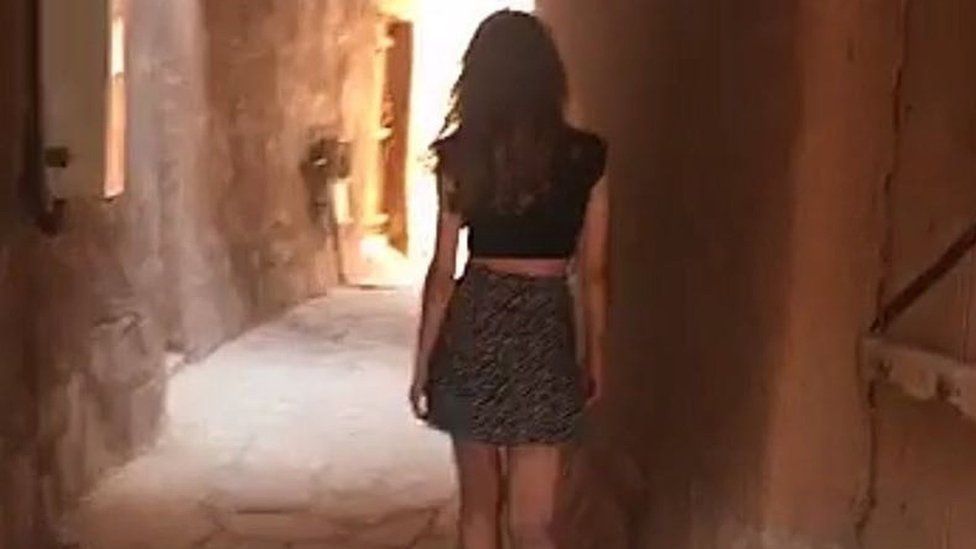Saudi police question miniskirt video woman
- Published

Saudi police have questioned a young woman who appeared in a video wearing a miniskirt and crop-top in public.
State TV said the woman who "dressed in indecent clothing" in Ushayqir had been "referred to the public prosecutor".
Local newspapers reported that she had "confessed" to visiting the historic village with her male guardian.
The video sparked a heated debate on social media, with some demanding she be punished for breaking the Muslim country's strict dress code.
Others came to the woman's defence, praising her "bravery" and insisting that she ought to be allowed to wear what she wanted.
Women in Saudi Arabia must wear loose-fitting, full-length robes known as "abayas" in public, as well as a headscarf if they are Muslim.
However, there are no restrictions on what women can wear under their abayas.
They are also banned from driving, are separated from unrelated men, and must be accompanied by or receive written permission from a male guardian - usually a father, husband or brother - if they want to travel, work or access healthcare.
The video was first shared on Snapchat over the weekend by a user called "Model Khulood".
It shows a woman walking along an empty street in a fort at Ushayqir Heritage Village, about 155km (96 miles) north of the capital Riyadh, in Najd province.
Allow Twitter content?
This article contains content provided by Twitter. We ask for your permission before anything is loaded, as they may be using cookies and other technologies. You may want to read Twitter’s cookie policy, external and privacy policy, external before accepting. To view this content choose ‘accept and continue’.
Najd is one of the most conservative regions in Saudi Arabia. It was where the founder of Wahhabism - the austere form of Sunni Islam that is practised by the Saudi royal family and religious establishment - was born in the late 18th Century.
The video was quickly picked up by Saudis on Twitter, where critics used the hashtag "demand_the_trial_of_Model_Khulood".
"We should respect the laws of the country. In France, the niqab [face-covering veil] is banned and women are fined if they wear it. In Saudi Arabia, wearing abayas and modest clothing is part of the kingdom's laws," read one tweet.
Other Saudis insisted that she should be allowed to wear what she wanted, and noted that US President Donald Trump's wife Melania and daughter Ivanka had chosen not to wear abayas or headscarves during a visit to Saudi Arabia in May.
In April, Saudi women's rights campaigners filmed themselves walking silently in protest against driving restrictions
"If she was a foreigner, they would sing about the beauty of her waist and the enchantment of her eyes... But because she is Saudi they are calling for her arrest," another tweet said.
On Tuesday afternoon, Saudi newspapers quoted a spokesman for Riyadh police as saying the woman had denied during questioning that she had uploaded the video online and told officers that the Snapchat account was not hers.
The spokesman added that the case had been referred to the public prosecutor's office, which will decide whether to charge the woman.
- Published6 June 2017
- Published4 July 2017
- Published5 January 2017
- Published8 March 2016